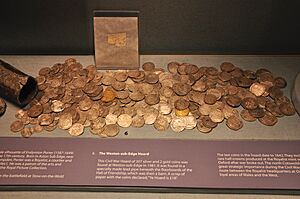Weston-sub-Edge hoard facts for kids
Quick facts for kids Weston-sub-Edge hoard |
|
|---|---|
 |
Imagine finding a secret treasure! The Weston-sub-Edge hoard is a collection of 309 old coins. These coins were hidden inside a lead pipe. This amazing discovery happened in Weston-Sub-Edge, a village in Gloucestershire, England. The coins are from the time of the English Civil War, a big conflict in England's history.
Contents
Discovery of the Treasure
When and Where It Was Found
The Weston-sub-Edge hoard was found in 1981. It was discovered in a building that used to be a barn. At the time, this building was being used as a village hall. The discovery happened in the village of Weston-sub-Edge itself.
How It Was Found
Workers were digging a pit for a new roof support. They found the lead pipe about 2 feet (0.6 metres) underground. The pipe was right in the middle of the building. It was lined up with the original roof parts from the 1600s.
What Was Inside the Pipe?
The Lead Pipe Container
The treasure was hidden inside a lead pipe. Both ends of the pipe were sealed shut. The pipe was about 270 millimeters (10.6 inches) long. It had a diameter of 55 millimeters (2.2 inches).
The Coins and a Secret Note
Inside the pipe were 309 coins. Most of them, 307, were made of silver. The other two coins were made of gold. There was also a small piece of paper. The paper had writing on it that said "hoard is £18". However, the actual value of the coins was a bit less. It was £17, 13 shillings, and sixpence.
Kings and Queens on the Coins
The coins in the hoard were made during the reigns of several English rulers. They ranged from Edward VI of England to Charles I of England. The newest coin in the collection was made in 1643.
Here's a breakdown of the coins by ruler:
- 6 coins from the time of Edward VI.
- 3 coins from Philip and Mary.
- 107 coins from Elizabeth I.
- 36 coins from James I.
- 157 coins from Charles I.
Where the Hoard Is Now
The Weston-sub-Edge hoard was officially declared a "Treasure trove" in September 1981. This means it was an important historical find. After that, the Corinium Museum bought the hoard. You can now see this amazing collection at the museum.
 | Valerie Thomas |
 | Frederick McKinley Jones |
 | George Edward Alcorn Jr. |
 | Thomas Mensah |

